

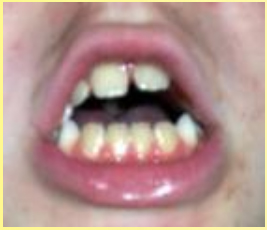
Malocclusion and Open Bite
Thumbsucking habits affect the natural positions of the tongue, lips, teeth, and jaw. A thumb or finger inside the mouth misplaces these structures by taking up the space where the tongue, lips, and teeth are normally located. If this habit continues over a period of time, it can lead to an open bite or other malocclusion. This, in turn, can lead to chewing, eating, and swallowing issues at meal times, causing misunderstandings and accusations that have long term negative consequences.
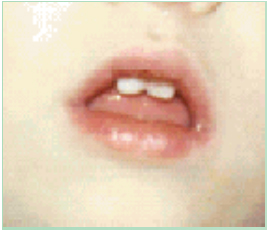
Chronic Mouth-Breathing
The nose has protective barriers to filter and “air condition” the air we breathe. These include cilia (tiny hairs), turbinates (twisting passageways), and the mucus membrane. When your child breathes through his mouth instead of his nose, the air is transported to the lungs without the benefit of these protective
barriers. This increases the likelihood of upper airway infections, middle ear infections, colds and more. Chronic mouth breathing may also alter normal facial growth. Because the jaw is held in an open posture, dental development is disrupted. Teeth in the upper jaw are meant to merge with the matching teeth in the lower jaw, fitting together like a puzzle. The intrusion of the thumb prevents this from happening. This, in turn, leads to malocclusion problems that orthodontic treatment alone might not be able to correct. Another symptom related to altered facial growth may be a lack of development of the walls of the nasal cavity. As your child pushes up on the roof of the mouth, the floor of the nasal chamber is also being pushed upward and reshaped into a smaller, narrower opening. This can dramatically affect the child’s breathing capacity.
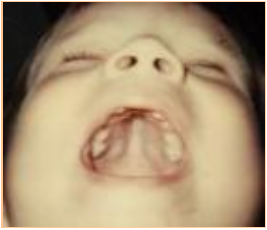
Deformed Hard Palate
High, narrow palates are often associated with sucking habits. The frequency, intensity and duration of a sucking habit are factors that affect the location and type of damage that can occur to the teeth, palate, lips, and mandible (jaw). Sometimes the actual bone structure is altered if a child sucks often, uses excessive force or continues the habit for long periods of time. As the thumb or any other object presses against the developing bones of the child’s palate, these bones may be molded into an unnatural “V” shape, rather than the ideal “U” shape.
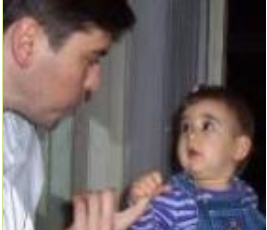
Speech Development
Since clear, precise speech is dependent upon the ability of the tongue, jaw, and lips to move rapidly from place to place within the mouth, it is important that they have a convenient resting place (“home base”). When a thumb, finger, pacifier or other object is inserted into the mouth, it displaces the natural resting positions of the tongue, jaw, and lips. Even when the thumb is removed, the structures remain in the incorrect position, creating yet another undesirable habit. Since the tongue has now learned the “wrong”
place to rest, that “wrong” place is where many speech sounds are produced, leading to such speech problems as lisping, articulation disorders, certain voice disorders, and overall mumbling and imprecise speech.
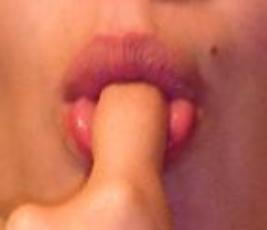
Studies
Have found that interaction in class as well as participation is affected and limited by sucking behaviors. Some children enter an almost trance-like state while sucking their thumbs or fingers. In such a state, they are not able to concentrate on subject matter being presented. Another study found that thumb suckers in first grade were considered less attractive, less happy, and less likable. And the other children were less likely to choose a thumb sucker for a friend. (Friman and Schmitt, Thumb Sucking: Pediatricians Guidelines. Clinical Pediatrics 1989) When this is how a first grader is perceived, it is hard to imagine the damage it can do to the self-esteem of an 8 or 10 year old….or an adult who never eliminated the problem!
Below are a few of the many stories that highlight the advantages of Unplugging The Thumb… some of which even came as a complete surprise to me! These are not research studies but rather the reports of parents who shared their medical histories and other information in order to show others the benefits eliminating this habit.
• Nutritional deficiencies and extreme pickiness- Brett, age 9 years, was diagnosed with anorexia. They called me for chewing and swallowing consultation because a nutritionist he had been seeing was not making any headway. I discovered that Brett had such a strong thumb sucking habit that his parents had given up on trying to eliminate it. The years of thumb sucking had caused a severe open bite malocclusion and chewing was extremely difficult for him. When he did eat, it was only selected foods and very small amounts. When I examined him, I found that he was unable to chew his food effectively and ended up swallowing large pieces of food as well as a lot of air. This caused him stomach distress. It was so difficult for Brett to maneuver many foods such as meats that he ended up avoiding much of the chewing process. Although not consciously aware of it, he began to eat less and less over time, eventually putting himself at risk. Our first target was to implement Unplugging The Thumb. He stopped on the first day and completed the program perfectly. We then were in a good position to provide therapy to help him improve his tongue, jaw, and lips so that chewing and swallowing could be achieved more easily. Orthodontic treatment was provided and the combination of factors led to a successful ending to his difficulties.
• Germs – Joey, four years old, was known as a little terror. Not too many kids have been kicked out of two preschools by the age of four! I was called in to evaluate and treat him in his home. He was a smiling, sweet boy with a devilish look about him and I immediately liked him a lot. After some probing, I learned that he had frequently missed going to school due to colds, ear infections, and other respiratory infections. He was an ardent thumb sucker as well as an active little boy. Because I treated him in his home, I took the opportunity to observe him playing, interacting with his cat and dog, and even playing outdoors. What I saw was Joey moving from thumb inside the mouth to picking up a dirty rubber ball and throwing it to the dog. Then he sat in his sandbox for awhile, thumb in mouth….a thumb covered with germs galore by then! This was repeated over and over throughout his day.....touching “germy” items, thumb inside mouth, touching and sucking thumb. I provided Unplugging The Thumb immediately since his speech problems were directly related to his sucking habit and subsequent malpositioned tongue and jaw. I never expected the extreme changes that occurred. Joey’s behavior improved tremendously and his self-esteem soared from having conquered his sucking habit. He was enrolled in a new preschool and functioned well. He responded well to speech therapy and progressed quickly. But it was approximately 6 months later that his parents and I realized that he had not had any respiratory infections, ear infections or colds. In short, if we remind ourselves that a thumb or finger is often attached to a little girl or boy who forgets to wash after potty, plays with dirty outdoor toys, crawls around on floors, etc. , then it is no surprise to us that eliminating the sucking habit will be very beneficial.
• Headaches – Michelle was a five-year-old thumb sucker whose father brought her to my clinic to eliminate a sucking habit and a lisp. While I was taking the medical history, he said that Michelle had been diagnosed as having migraine headaches. The headaches occurred almost daily, and they were accompanied by bouts of throwing up. She had seen several medical professionals, but no one could find any reason for her headaches. I started her on Unplugging The Thumb program. She phoned me the next day to report that she had quit sucking her thumb the first day. This continued for 5 more days and then she came in for her scheduled appointment. Her father reported that the migraines had completely stopped and that she was symptom free. He said there had been no other changes in her life, only the cessation of her sucking habit. He stated that there was no doubt in his mind that stopping the sucking habit had led to relief from the migraines.
Adult sufferers - Last, I would like to share stories of adults who have emailed or phoned me, asking for help to eliminate sucking habits. Since they usually lived far from me, and since they were too old to benefit from Unplugging The Thumb, I someone had helped them when they were younger, before the habit became so entrenched that it invaded every aspect of their lives.
• Mandy is a high school teacher who was in her first year of teaching when she contacted me. She found it difficult to get through an entire class without sucking her thumb. She became a clock watcher, waiting for each class to end so she could go hide somewhere “safe” and suck on her thumb. She said she had no other addictive tendencies and that thumb sucking was her only bad habit. It interfered with her ability to date and mingle socially. No one had tried to help her when she was a child and now she was feeling very hopeless about ever being able to stop.
• Katie was a 16 year old who had recently tried to stop sucking her thumb at the encouragement of her youth counselor, who was a good friend of the family. The counselor contacted me first because she was very concerned about Katie. She said that Katie’s behavior had changed, she was unhappy, not sleeping well, and more. I told her to have Katie contact me directly, which she did. Being a young lady now, Katie had decided that she must stop her sucking habit if she was going to “fit in” socially and lead a normal life. She did not know where to seek guidance and had spent the last two weeks trying to stop “cold turkey” on her own. She ended up staying awake nearly every night, so as to avoid sucking her thumb while asleep. She had done some research online and realized that she had an abnormal tongue resting posture from the sucking habit. Katie also worried about that bit of new information. In all other ways, she was a model child who had never had any other bad habits. Her mother also ended up writing to me, begging me to help her if I could. I was able to refer her to a colleague who lived near her and she was able to finally combat her problem. They all agreed that this could have been avoided if the adults in her life had known years ago that there was a kind method to eliminate her habit.
• Jessica contacted me because the crevice at the base of her thumb began to peel and was very sore. Also, she said her teeth were “getting worse” and she was becoming very worried. She was a college graduate in her twenties and had a good job at a bank. She admitted that she sucked her thumb around her friends, her family, and her boyfriend in spite of a lot of negative attention from them. She said she’d been allowed to suck her thumb wherever and whenever she wanted during her childhood, but as an adult her family became intolerant. Now that she was experiencing pain and dental problems, she was very scared and wanted help. I am not sure about the ending of this story. I sent a suggested plan of action to Jessica, but never heard back. With some adults, the habit has been ongoing for so many years and has become so entrenched that perhaps it cannot be eliminated.
